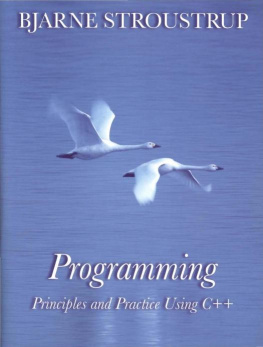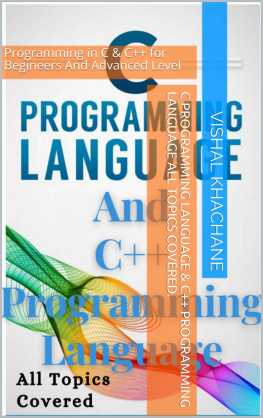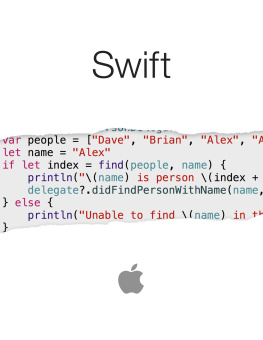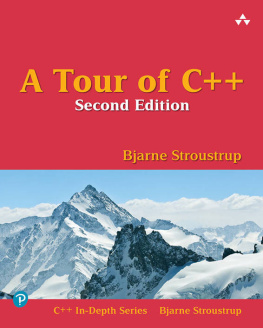Stroustrup - The C++ Programming Language
Here you can read online Stroustrup - The C++ Programming Language full text of the book (entire story) in english for free. Download pdf and epub, get meaning, cover and reviews about this ebook. year: 2013, publisher: Pearson Education Limited (US titles), genre: Home and family. Description of the work, (preface) as well as reviews are available. Best literature library LitArk.com created for fans of good reading and offers a wide selection of genres:
Romance novel
Science fiction
Adventure
Detective
Science
History
Home and family
Prose
Art
Politics
Computer
Non-fiction
Religion
Business
Children
Humor
Choose a favorite category and find really read worthwhile books. Enjoy immersion in the world of imagination, feel the emotions of the characters or learn something new for yourself, make an fascinating discovery.

- Book:The C++ Programming Language
- Author:
- Publisher:Pearson Education Limited (US titles)
- Genre:
- Year:2013
- Rating:5 / 5
- Favourites:Add to favourites
- Your mark:
- 100
- 1
- 2
- 3
- 4
- 5
The C++ Programming Language: summary, description and annotation
We offer to read an annotation, description, summary or preface (depends on what the author of the book "The C++ Programming Language" wrote himself). If you haven't found the necessary information about the book — write in the comments, we will try to find it.
The C++ Programming Language — read online for free the complete book (whole text) full work
Below is the text of the book, divided by pages. System saving the place of the last page read, allows you to conveniently read the book "The C++ Programming Language" online for free, without having to search again every time where you left off. Put a bookmark, and you can go to the page where you finished reading at any time.
Font size:
Interval:
Bookmark:
ePUB is an open, industry-standard format for eBooks. However, support of ePUB and its many features varies across reading devices and applications. Use your device or app settings to customize the presentation to your liking. Settings that you can customize often include font, font size, single or double column, landscape or portrait mode, and figures that you can click or tap to enlarge. For additional information about the settings and features on your reading device or app, visit the device manufacturers Web site.
Many titles include programming code or configuration examples. To optimize the presentation of these elements, view the eBook in single-column, landscape mode and adjust the font size to the smallest setting. In addition to presenting code and configurations in the reflowable text format, we have included images of the code that mimic the presentation found in the print book; therefore, where the reflowable format may compromise the presentation of the code listing, you will see a Click here to view code image link. Click the link to view the print-fidelity code image. To return to the previous page viewed, click the Back button on your device or app.
Fourth Edition
Bjarne Stroustrup

Upper Saddle River, NJ Boston Indianapolis San Francisco
New York Toronto Montreal London Munich Paris Madrid
Capetown Sydney Tokyo Singapore Mexico City
Many of the designations used by manufacturers and sellers to distinguish their products are claimed as trademarks. Where those designations appear in this book, and the publisher was aware of a trademark claim, the designations have been printed with initial capital letters or in all capitals.
The author and publisher have taken care in the preparation of this book, but make no expressed or implied warranty of any kind and assume no responsibility for errors or omissions. No liability is assumed for incidental or consequential damages in connection with or arising out of the use of the information or programs contained herein.
The publisher offers excellent discounts on this book when ordered in quantity for bulk purchases or special sales, which may include electronic versions and/or custom covers and content particular to your business, training goals, marketing focus, and branding interests. For more information, please contact:
U.S. Corporate and Government Sales
(800) 382-3419
For sales outside the United States, please contact:
International Sales
Visit us on the Web: informit.com/aw
Library of Congress Cataloging-in-Publication Data
Stroustrup, Bjarne.
The C++ programming language / Bjarne Stroustrup.Fourth edition.
pages cm
Includes bibliographical references and index.
ISBN 978-0-321-95832-7 (pbk. : alk. paper)ISBN 0-321-95832-2 (pbk. : alk. paper)
1. C++ (Computer programming language) I. Title.
QA76.73.C153 S77 2013
005.133dc23 2013002159
Copyright 2013 by Pearson Education, Inc.
All rights reserved. Printed in the United States of America. This publication is protected by copyright, and permission must be obtained from the publisher prior to any prohibited reproduction, storage in a retrieval system, or transmission in any form or by any means, electronic, mechanical, photocopying, recording, or likewise. For information regarding permissions, request forms and the appropriate contacts within the Pearson Education Global Rights & Permissions Department, please visit www.pearsoned.com/permissions/#.
This book was typeset in Times and Helvetica by the author.
ISBN-13: 978-0-321-95832-7
ISBN-10: 0-321-95832-2
Seventh printing, December 2017
7 17
All problems in computer science can be solved by another level of indirection, except for the problem of too many layers of indirection.
David J. Wheeler
C++ feels like a new language. That is, I can express my ideas more clearly, more simply, and more directly in C++11 than I could in C++98. Furthermore, the resulting programs are better checked by the compiler and run faster.
In this book, I aim for completeness. I describe every language feature and standard-library component that a professional programmer is likely to need. For each, I provide:
Rationale: What kinds of problems is it designed to help solve? What principles underlie the design? What are the fundamental limitations?
Specification: What is its definition? The level of detail is chosen for the expert programmer; the aspiring language lawyer can follow the many references to the ISO standard.
Examples: How can it be used well by itself and in combination with other features? What are the key techniques and idioms? What are the implications for maintainability and performance?
The use of C++ has changed dramatically over the years and so has the language itself. From the point of view of a programmer, most of the changes have been improvements. The current ISO standard C++ (ISO/IEC 14882-2011, usually called C++11) is simply a far better tool for writing quality software than were previous versions. How is it a better tool? What kinds of programming styles and techniques does modern C++ support? What language and standard-library features support those techniques? What are the basic building blocks of elegant, correct, maintainable, and efficient C++ code? Those are the key questions answered by this book. Many answers are not the same as you would find with 1985, 1995, or 2005 vintage C++: progress happens.
C++ is a general-purpose programming language emphasizing the design and use of type-rich, lightweight abstractions. It is particularly suited for resource-constrained applications, such as those found in software infrastructures. C++ rewards the programmer who takes the time to master techniques for writing quality code. C++ is a language for someone who takes the task of programming seriously. Our civilization depends critically on software; it had better be quality software.
There are billions of lines of C++ deployed. This puts a premium on stability, so 1985 and 1995 C++ code still works and will continue to work for decades. However, for all applications, you can do better with modern C++; if you stick to older styles, you will be writing lower-quality and worse-performing code. The emphasis on stability also implies that standards-conforming code you write today will still work a couple of decades from now. All code in this book conforms to the 2011 ISO C++ standard.
This book is aimed at three audiences:
C++ programmers who want to know what the latest ISO C++ standard has to offer,
C programmers who wonder what C++ provides beyond C, and
People with a background in application languages, such as Java, C#, Python, and Ruby, looking for something closer to the machine something more flexible, something offering better compile-time checking, or something offering better performance.
Naturally, these three groups are not disjoint a professional software developer masters more than just one programming language.
This book assumes that its readers are programmers. If you ask, Whats a for-loop? or Whats a compiler? then this book is not (yet) for you; instead, I recommend my Programming: Principles and Practice Using C++ to get started with programming and C++. Furthermore, I assume that readers have some maturity as software developers. If you ask Why bother testing? or say, All languages are basically the same; just show me the syntax or are confident that there is a single language that is ideal for every task, this is not the book for you.
Font size:
Interval:
Bookmark:
Similar books «The C++ Programming Language»
Look at similar books to The C++ Programming Language. We have selected literature similar in name and meaning in the hope of providing readers with more options to find new, interesting, not yet read works.
Discussion, reviews of the book The C++ Programming Language and just readers' own opinions. Leave your comments, write what you think about the work, its meaning or the main characters. Specify what exactly you liked and what you didn't like, and why you think so.





